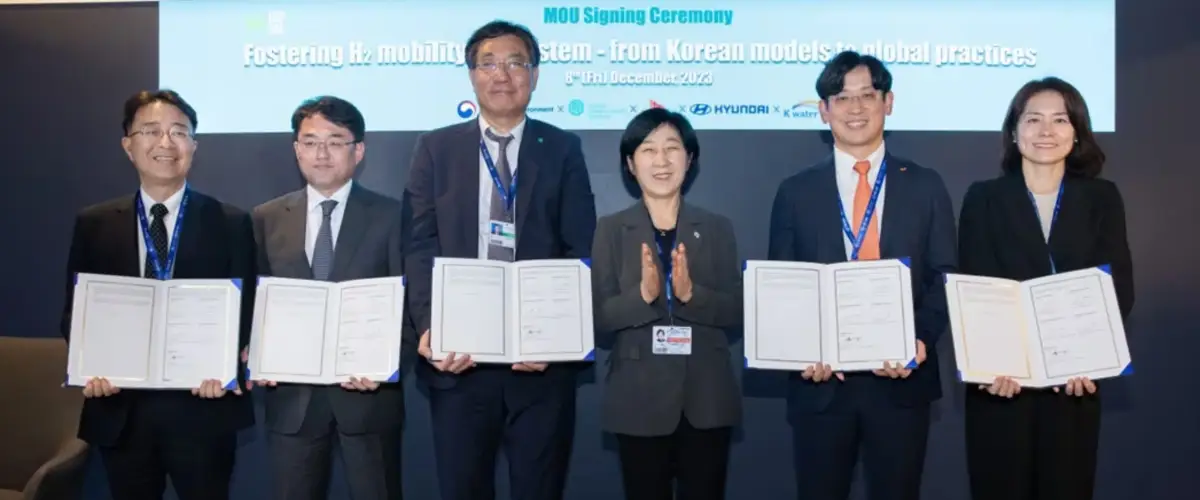- MOU signed with South Korea’s Ministry of Environment, Korea Water Resources Corp., Global Green Growth Institute and SK E&S at Dubai Expo during COP28
- Agreement aims to share leading hydrogen practices worldwide to rapidly expand the global hydrogen ecosystem and more actively respond to climate change
- Hyundai Motor to introduce a resource-circulating hydrogen production project utilizing biogas
- Global Green Growth Institute (GGGI) to publish an assessment report, including various case studies, to share with the international community
Hyundai Motor Company has signed a memorandum of understanding (MOU) to promote the development of the global hydrogen ecosystem. The signing took place with South Korea’s Ministry of Environment, Korea Water Resources Corp., Global Green Growth Institute (GGGI) and SK E&S at the Dubai Expo during the COP28 World Climate Summit.*
Signing ceremony attendees included Chul Youn Park, Head of Global Hydrogen Business in Hyundai Motor Company; Minister Wha-jin Han of the Ministry of Environment; and other participants from the United Nations Economic and Social Commission for Asia and the Pacific (UNESCAP), United Nations Economic and Social Commission for Asia and the Pacific (UNESCAP), Korea Water Resources Corporation, Global Green Growth Institute (GGGI), and SK E&S.
The agreement aims to rapidly grow the global hydrogen ecosystem and respond more actively to climate change by sharing leading examples of hydrogen ecosystem development currently underway in Korea with the international community. To this end, Hyundai Motor and its Korean partners will provide case studies and consultation on hydrogen projects and GGGI will publish an evaluation report based on the case studies for international sharing.
Hyundai Motor is taking the lead by introducing its ‘Waste-to-Hydrogen’ process and actively expanding its application in the global market. This resource-recycling hydrogen production method produces clean hydrogen using biogas from organic wastes, such as food waste, sewage sludge and livestock manures. It removes impurities like methane while producing an eco-friendly energy source through waste resource utilization.
Hyundai Motor’s waste-to-hydrogen production process underscores the importance of reducing methane, a major contributor to climate change. The company is actively fostering the biogas industry, converting methane from waste into hydrogen for eco-friendly mobility, power generation and industrial use. Waste-to-hydrogen facilities in South Korea produce around 500 kilograms of hydrogen daily, contributing to a carbon-neutral approach through renewable energy use.
The company is focused on a comprehensive hydrogen package business, integrating the entire value chain for a circular economy in the hydrogen society. For this purpose, the company has engaged in the Waste-to-Hydrogen business, aiming to facilitate the establishment of a global hydrogen ecosystem by supplying eco-friendly hydrogen, even in regions without renewable energy resources. The project is expected to develop hydrogen production mini-hubs at a regional level, which will lead to the formation of hydrogen industrial clusters, thereby driving the hydrogen society.
The global expansion of this initiative, particularly in the ASEAN region, reflects Hyundai Motor’s commitment to creating a sustainable global hydrogen ecosystem and realizing a hydrogen society.
In addition, the Ministry of Environment will provide cases of hydrogen vehicle distribution and the establishment of charging station ecosystems. The Korea Water Resources Corporation will offer cases of hydrogen production and utilization for transportation using hydropower generation. SK E&S will provide cases of liquefied hydrogen production and utilization for the publication of international organization reports and contribute to the global spread of the business model. GGGI will publish a report after evaluations of the examples provided.
Our Waste-to-Hydrogen model is an eco-friendly hydrogen production method that has already been successfully deployed and proven in Korea. Through this agreement, we aim to further promote the benefits of Waste-to-Hydrogen production, expand the adoption of the model worldwide and amplify the real-world business growth by leveraging our global leadership in Waste-to-Energy technology and hydrogen ecosystem presence.
Chul Youn Park – Head of Global Hydrogen Business in Hyundai Motor Company
Hyundai Motor has been actively making efforts toward achieving carbon neutrality and realizing its vision for the hydrogen ecosystem, including announcing plans for the establishment of a ‘Hydrogen Business Toolbox’ during the ‘2023 CEO Investor Day’ in June.
Pictured above: Youngseok Lee, Director General of Climate Change Policy Bureau, Ministry of Environment / Chul Youn Park, Head of Global Hydrogen Business in Hyundai Motor Company / Kyung Nam Shin, Assistant Director General, Global Green Growth Institue (GGGI) / Minister Wha-jin Han of the Ministry of Environment / Yoosup Soh, Head of Hydrogen Business Development Group / Eunjeong Oh, CMO of the Environmental Energy Management Division at the Korea Water Resources Corporation (from left)
* COP, the Conference of the Parties to the UN Framework Convention on Climate Change, is held annually to discuss concrete implementation measures of the Convention, which was signed at the UN Conference on Environment and Development in 1992.
